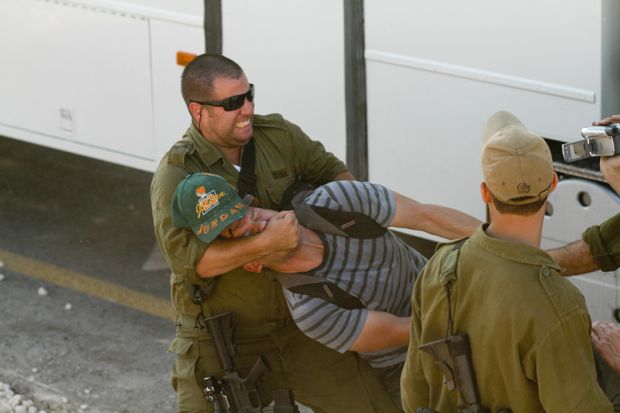
Credit: Emil Salman
The man in the choke-hold is Chaim Levinson, Haaretz’s correspondent for issues related to West Bank Jewish settlements. Soldiers assaulted him and confiscated his mobile phone on August 10, while he was covering a march of right-wing activists on their way to establish another illegal outpost at the site of an ancient synagogue near Jericho. According to photographer Emil Salman, the soldiers assaulted Levinson because he was
…grabbing his own phone from the hands of an officer who took it in order to delete photos of himself. Needless to say, he had no right to take the phone, or delete the photos, even if he didn’t like it so much.
And Chaim only took his photo after he wouldn’t identify himself properly.
Salman adds:
the armed forces’ (including all security personnel, police, mall guards) attitude towards the press is steadily detiriorating and is surely following the footsteps of darker, less “Western” regimes.
We are targeted on a daily basis, our press card is a scarlet letter that I personally try to hide, our cameras are police evidence, our profession a source of scorn and ridicule, and in many ways we are less privileged than an ordinary citizen. At any point of friction between civilians and security, the press are targeted first, denied access, pushed to the ground, constantly threatened and abused verbally.
Salman’s photo illustrates a little-reported, but widespread phenomenon of media censorship in the Wild West Bank, where democratic laws and values are rarely applied and the IDF makes up policy as it goes along. The army ignores not only Israeli Supreme Court rulings, but even its own policy regarding the use of live ammunition and tear gas canisters for crowd control. Reporters Without Borders regularly publishes press releases deploring the IDF’s treatment of Palestinian journalists, who seem to have no rights at all: they are beaten, shot at and arrested while doing their jobs; and their cameras are often damaged or confiscated.
Chaim Levinson’s case made Ynet, Israel’s most widely-read news-source, in both Hebrew and English. It doesn’t get any more mainstream than Ynet – and there’s even a video clip showing Levinson being assaulted. But if reporters get beaten up by soldiers all the time in the West Bank, how come this story made the news in Israel?
You probably know where I’m going with this one:
1) The demonstrators were right-wing – settlers, to be precise – and for a change they were actually arrested for breaking the law. This is a rare occurrence.
2) The reporter is a Jewish Israeli. Ashkenazi, even! True, he works for a left-wing newspaper, but he is not a settler basher. Some say he is a bit too sympathetic to the settlers, and that he uses adjectives which betray a bias against human rights NGOs that work on behalf of Palestinians.
These days, it is very difficult to sell a story about IDF lawlessness in the West Bank. In the West, attention has turned to Afghanistan, Pakistan and Iraq. You can see this in the fact that so many former Jerusalem bureau chiefs were transferred to Kabul and Islamabad, from whence they cover the entire Middle East (budget cuts). The story of Israel-Palestine is stuck on a loop, and editors are bored with oppressed Palestinians, undisciplined IDF soldiers and violent, lawless settlers. For most Israelis, the occupation is just ‘background noise,’ as one friend described it.
Perhaps that is why no-one notices that press freedom is being steadily eroded in Israel – because the story is not being covered by the western media, or even by the mainstream Israeli media. Few people seem to care about the issue.
The next time you see a soldier or border police officer in the West Bank whose name is not displayed clearly on his uniform, try asking him why he’s violating regulations by hiding his identity. If you ask nicely, he’ll probably ignore you. But if, like Chaim Levinson, you photograph him and threaten to report him for violating regulations, you might be assaulted, have your phone confiscated and even be arrested.

